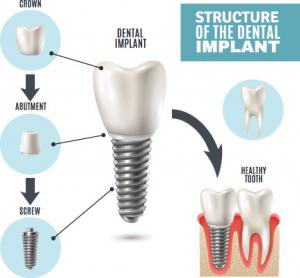Dental implants are all the rage in dentistry—and perhaps rightly so. They come in a myriad of shapes and sizes, but root form implants are the focus in dentistry now—and in our practice. They solve a host of problems, but what are they? Why are they beneficial? And how do you know if you are a good candidate for this alternative? We’ll tell you now.
What are dental implants?
 Envision the root system of trees. It anchors the tree in the earth, holds it upright, and provides nourishment to the tree limbs and trunk of the tree. Similarly, your teeth are rooted in sturdy base and alveolar bone. They are held tightly in place and enable you to consume food (mastication), live, and thrive. But when you lose a tooth—or several teeth—your body compensates by reordering the placement of your teeth in the architecture of your mouth. That can create havoc—and a myriad of dental problems to boot. It can even affect your overall physical health.
Envision the root system of trees. It anchors the tree in the earth, holds it upright, and provides nourishment to the tree limbs and trunk of the tree. Similarly, your teeth are rooted in sturdy base and alveolar bone. They are held tightly in place and enable you to consume food (mastication), live, and thrive. But when you lose a tooth—or several teeth—your body compensates by reordering the placement of your teeth in the architecture of your mouth. That can create havoc—and a myriad of dental problems to boot. It can even affect your overall physical health.
Enter dental implants. They mimic the root of a tooth and can be also used to help reinforce a short or weakened jawbone. Dental implants are composed of titanium alloys, which include a “mixture of titanium and other chemical elements”* that are strong, durable, and light weight. Moreover, titanium alloys are considered bio-compatible with bone and therefore, non-reactive in the human body. At the Miler Center for Cosmetic Dentistry, we believe dental implants are often an ideal solution for men or women who are absent a tooth, several teeth, and/or in need of a bridge or partial.
What is osteointegration?
The dental implant is surgically placed into the jawbone, which includes both base bone and alveolar bone, and are allowed to fully integrate into the bone structure, a process that is referred to as osteointegration. This process is considered a major advancement in dental science and a lifesaver for many people who would otherwise have to live without teeth. Once successfully implanted, oral surgery is complete and the healing process begins. According to our experience and present-day research, it takes about three to four months before the jaw is fully healed. After healing is complete, a tiny metal “post” is fastened to the small titanium implant, which is later followed by a temporary crown until the final porcelain crown, bridge, or denture, is ready for installation. The end result: A new, natural-looking replacement tooth—or teeth—with full chewing functionality and the anesthetics of natural teeth—shape, appearance, luminosity.
*Source: en.wikipedia.org/wiki/Titanium_alloy
What are the benefits?
Dental implants offer our patients many benefits, including:
- Helping to preserve jawbone, which is lost gradually through the process of tooth extractions and therefore, can have lasting consequences.
- Halt any chance of malocclusion, which refers to changes in teeth placement and bite, and can likewise prevent halitosis (bad breath) and periodontitis (gum disease).
- Stave off changes to a person’s face and appearance, often referred to as “facial atrophy,” by simply enabling proper chewing force, which in, and of itself, helps exercise facial muscles and thus, maintain facial tautness.
- Enable good health through the proper chewing which enables a healthy digestive processes throughout the body.
- Safer alternative to conventional dentures, which, especially in older adults, can contribute to aspiration or choaking form food blocking the airway.
Do all dentists provide this surgery?
Although some dentists advertise dental implants as a service, not all dentists have the education and training needed to successfully perform oral surgery. The Pittsburgh PA based dental implant team of Dr. Stephen M. Miller in partnership with Dr. Charu Chandra, his on-site visiting periodontist, provide dental implants—from developing a treatment plan to coordinating your care. This 18-year partnership has been quite a success. Maybe that explains why Dr. Miller and Dr. Chandra have received “Top Dentist” honors, again and again, from Pittsburgh Magazine.
Are you a candidate?

 The best way to determine whether dental implants are the right choice for you is to visit the Miller Center for Comprehensive Dentistry in Oakland to personally meet with Dr. Miller to assess your individual situation. However, here are a few characteristics of persons commonly considered good candidates:
The best way to determine whether dental implants are the right choice for you is to visit the Miller Center for Comprehensive Dentistry in Oakland to personally meet with Dr. Miller to assess your individual situation. However, here are a few characteristics of persons commonly considered good candidates:
- Healthy teeth, gum tissues, and jawbone
- Absence of advanced periodontitis
- Excellent oral health habits
- Adequate base and alveolar bone structure
- Good overall bodily health
What should I do to next if I am interested in this alternative?
If you are interested in getting dental implants, your first step is to set-up an appointment for an examination by calling our Pittsburgh Dental Implant team at the Miller Center for Comprehensive Dentistry - 412-681-7171. The examination will include:
- Discussion about your current health situation as well as your medical history
- Inspection of the mouth, teeth, jaws, and gum tissue
- X-rays and possibly a CT (CBCT) scan to qualify the amount of jawbone available to support and accept dental implants
If you are a candidate, Dr. Miller will personally coordinate your care with Dr. Chandra and monitor your progress throughout this multi-step process. Patient satisfaction is extremely high, so if you need implants, we encourage you to call the Miller Center for Comprehensive Dentistry at 412-681-7171 to get started.

